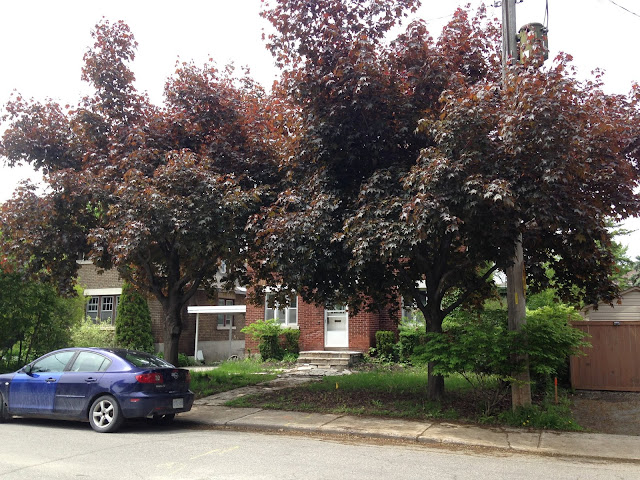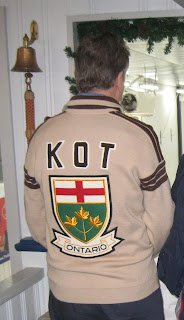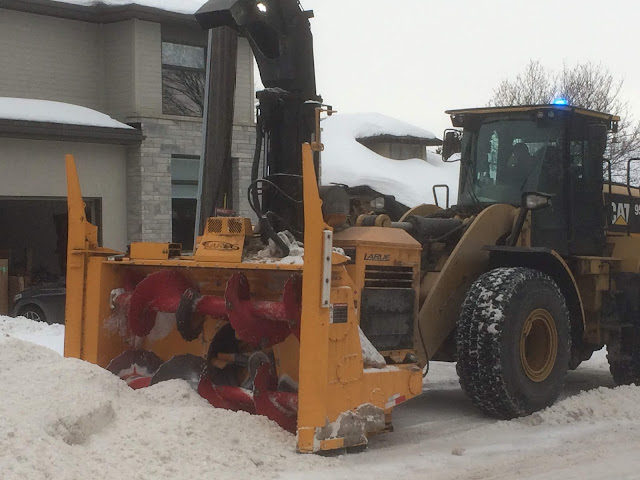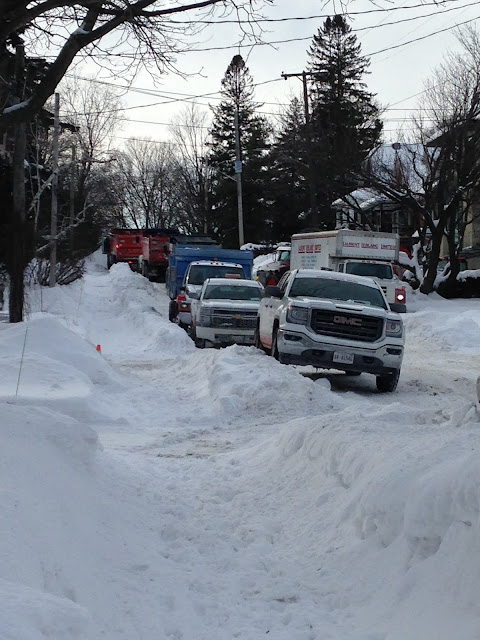If you hang around long enough and write some grouchy oped pieces, eventually you may get asked for an interview - that is, if the young writer is looking for a neighbourhood curmudgeon. That's what happened a couple of months ago, when I had a call from Taylor Blewettt, of the Ottawa Citizen. She had read my 2008 piece about Wellington Street. It was called Losing a Useful Store.
My friend Christine and I sat down to talk with Ms. Blewett, about the current state of our main street, Wellington. The area is called Wellington West but it's confusing. There is our Wellington Street and there's also Wellington St. downtown, where Parliament Hill is located. To add to the confusion, our Wellington Street changes names, to become Richmond Road. Anyhow, it was interesting to read Ms. Blewett's piece, with other opinions on what happens when an area becomes so desirable.
Click
here to read Ms. Blewett's piece, which appeared in The Citizen on May 9th.
From January 15, 2008, here is my Losing a Useful Store:
When my husband and I moved back
to Ottawa in the late '80s, we decided to come back to this end of town, now
called Wellington West,
because it was a lovely old-fashioned neighbourhood.
There were children, bikes and strollers all over, so we knew we
were in the right place. We liked the fact that we were near the Transitway and
within walking distance to shops all along Wellington Street and Richmond Road.
While many extol the virtues of this currently fashionable
neighbourhood, some of us old-timers are mourning the loss of the way it was.
If you think it's a great place now, you should have experienced it before it
yuppified. It was just ordinary families walking and biking to small, local
stores. That was before house prices went crazy, before people started tearing
down perfectly fine houses to build mansions, before retailers convinced us
that bigger stores were better for us, and before Wellington Street had all
these exclusive baby stores selling infant undershirts for more money than we
paid for a second-hand stroller.
At our main corner of Clarendon and Wellington, we had Carver's
Drugstore, with a post office, a branch of the CIBC, a video store and for many
years, Wellington News -- a great place for newspapers, magazines and cards.
The drugstore is now blocks away, at the corner of Parkdale Avenue and
Wellington Street. It's much larger and probably sells 50 different kinds of
shampoo but I'd rather have the original, cramped store. There was a post
office at that corner for as long as my mother can remember (and she just
turned 80) but last year, when Wellington Street Cleaners moved to Hintonburg,
the post office went with it. CIBC closed their tiny branch, making Carlingwood
the closest branch for its loyal customers. The video store and Wellington News
are also gone.
At Holland Avenue, we had some real frills: a Laura Secord Store,
a Biway, a liquor store and our own movie place -- the Elmdale Theatre -- all
gone now. Of course, pretty well all our old movie houses have disappeared, in
favour of the flashy, multi-screen warehouses. This year we lost the liquor
store. If you want to pick up a bottle of wine now, you've got to go west to
the new, (huge, of course) LCBO, next to the Superstore -- the grocery store
where you have to walk the distance of a city block to find milk.
I'm not a fan of big stores. I'd much rather go to our local Loeb,
where I can find what I want and inevitably meet some of my neighbours. When I
do go into big stores, I waste too much time looking for items and waiting in
line.
Fortunately, we still have some of our long-term establishments
that make life enjoyable: Ottawa Bagel, Herb and Spice, Home Hardware, Fresh
Air Experience, John's Quick Lunch, Thyme and Again are but a few. Some of the
newer places like the bakeries and restaurants, GCTC, Collected Works and World
of Maps, are all great additions.
So, it's not that I'm against progress and new initiatives. I
simply find that the loss of basic services to a neighbourhood is detrimental,
both to the 'environment' and the community. Back in the '50s, before we had
heard of the word environment, our neighbourhoods were actually fairly
eco-friendly because we were able to satisfy most of our needs in our own
geographical areas. Then came the suburbs, with their houses set up far from
stores, necessitating all that driving to malls. Now, as some of our inner city
neighbourhoods become more popular, causing retail rents to rise dramatically, many small businesses
leave, forcing inhabitants of these traditional old areas to do what suburban
dwellers do -- drive to access basic services like banks, post offices,
pharmacies, hardware and grocery stores -- in big impersonal stores. With all
that driving, we lose the friendly, community feeling that comes with running
into the same people as you shop in a small geographical area. Isn't it ironic,
that as the environmental movement is constantly encouraging us to buy local
and drive less, some of us who moved to traditional neighbourhoods to do just
that, are being forced to travel farther?
On my last trip to that Canadian Tire store, I asked a cashier
about the new store. "You should see it!" she enthused. "It's so
big, it has criss-cross escalators." Well, I don't give a darn about
criss-cross escalators. I'll go to our tiny Home Hardware for as many of our
hardware needs as they can provide. Unfortunately, they don't have an
automotive section, so the next time I need to replace a windshield-wiper
blade, I'll have to venture in, to the newest shrine to retail excess.
As I left the old store, I read, once again, the memorial plaque
on the front of the store. It's dedicated to the late Trevor Smith , who worked
there for 40 years. That's the kind of time it was, when you would shop at your
neighbourhood store and see the same employees, people who knew you. That was
back when my dad first took me there, when he was teaching us about cars and
later sending us there, to pick up parts, downstairs, in the automotive
section. There were no escalators, criss-cross or ordinary, just the stairs to
the basement. It was another era.




















































